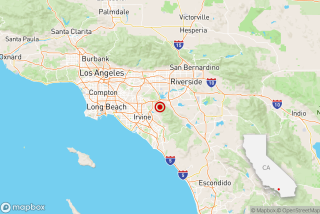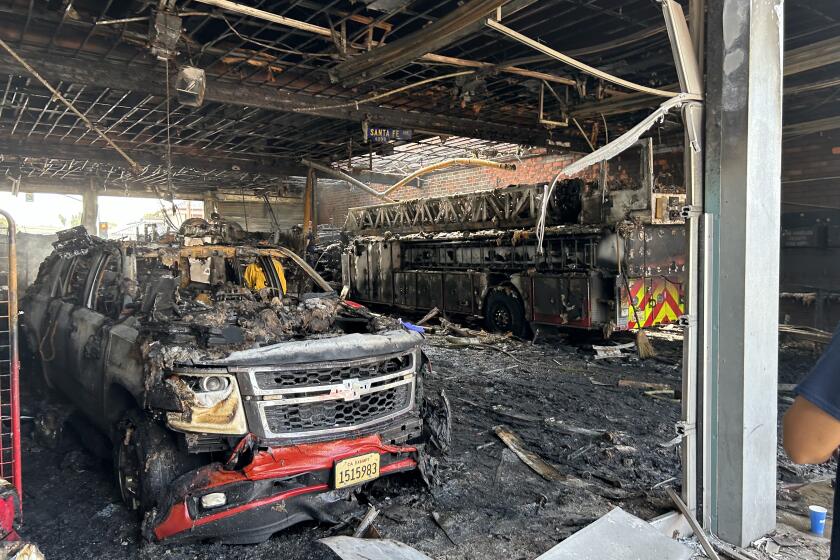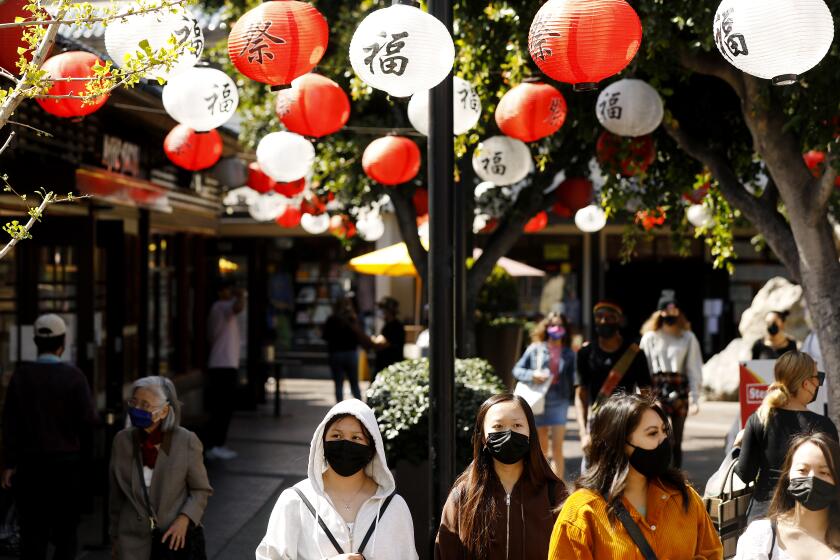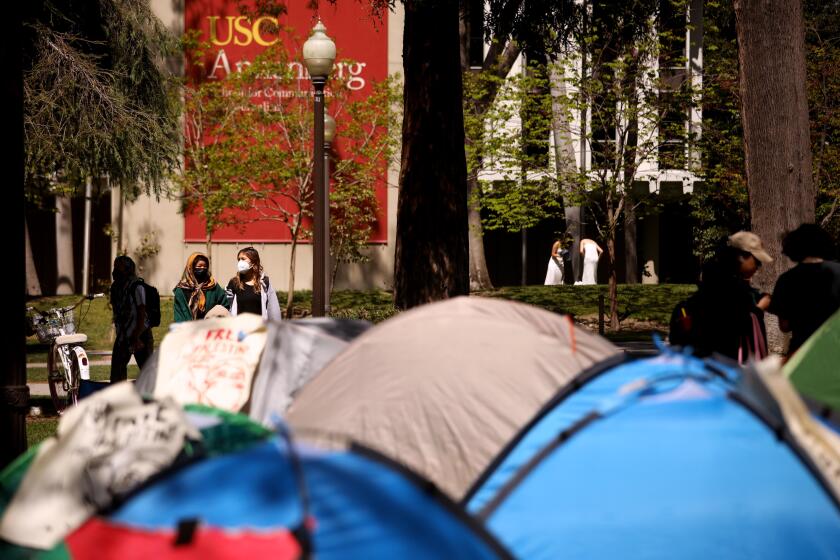Need for dental care overwhelms free clinic in Los Angeles
Overwhelmed by demand for dental services, organizers of a massive free mobile health clinic asked some patients who had Tuesday appointments to return next week, a hitch in an otherwise smooth first day at the Los Angeles Memorial Sports Arena.
The need for dental work was nearly double what organizers saw on the first day of a similar free clinic held in August, said Roger Fieldman, a dentist who serves as volunteer dental director.
Much of the increased demand was tied to the state’s elimination of adult Denti-Cal last summer, Fieldman said. The cut, made because of the state’s budget crisis, left about 3 million people without dental insurance.
Esther Thomas, 61, of Los Angeles was among the 115 dental patients told to return Monday, the final day of the weeklong clinic.
Thomas, whose orange wristband guaranteed her a spot on the first day, had a medical checkup, then waited four hours before she got the bad news.
“It started out real cool, but they lost control,” said Thomas, a retired elementary school teacher who does not yet qualify for Medicare.
Thomas said she would be back. Even though a volunteer explained that the clinic was not making new dentures and could not guarantee that repairs would be attempted, Thomas said she still hoped to get her 20-year-old partial dentures replaced.
The goal this year is to serve about 1,200 people each day. Reaching it will depend on the turnout of volunteer doctors, dentists and other medical professionals and, ultimately, what services patients need the most.
“We got slammed in dental,” said Don Manelli, who is heading the Los Angeles effort for the Tennessee-based nonprofit Remote Area Medical. “We’ll catch up with most of them.”
Tuesday got off to a somewhat slow start, with about half of the expected medical professionals reporting in the morning. Still, by day’s end about 300 volunteers had served, close to what organizers had hoped to see.
Nurse practitioners and doctors, especially specialists such as dermatologists, ophthalmologists, obstetricians, gynecologists and family practice doctors, are still needed, organizers said.
Overall, the clinic’s first day — which included a tour by California First Lady Maria Shriver and coverage from national news outlets — appeared to go well.
“This is a great day for L.A., but it’s also a sobering moment in our state and our country,” Shriver told the crowd. “You walk through here and you see the need.”
She shook hands with Freddie Graham, 61, a retired security supervisor at Los Angeles International Airport, who has no dental insurance.
Asked whether she would convey what she had seen to her husband, Gov. Arnold Schwarzenegger, who cut the Denti-Cal program, Shriver said, “I don’t need to tell the governor; he and everyone knows what the budget situation is. California’s issues are not unique.”
After scores of people were turned away from the August clinic, which served more than 6,300, organizers took steps this time to minimize waits and improve services, most notably by distributing wristbands rather than relying on first-come, first-served admission.
They were met with new issues Tuesday. Given the volume of patients, as well as some missing dental equipment (a donor failed to deliver some X-ray machines while others were restricted by county regulators), volunteer dentists were instructed to offer each patient only one service: teeth cleaning, extraction or filling.
But many of the roughly 110 dentists, dental students and hygienists who volunteered over the course of the day had difficulty refusing patients in need of multiple services, which caused delays, organizers said.
With fewer dentists registered to volunteer at the clinic Wednesday, dental volunteers will have to more strictly limit services in order to see as many patients as possible, Fieldman said.
“They’re begging for it, and it hurts us to say no,” he said.
Many patients were looking for cosmetic dentistry— new dentures, partial dentures, bridges and crowns, none of which are offered at the clinic. Similar services had been offered during the August clinic but proved too time-consuming, Fieldman said.
Some patients also wanted molar root canals, which the clinic did not offer. Fieldman said clinic dentists are performing limited root canals for other teeth, but not molars, because they require added time, equipment and expertise.
Alisha Brown, the first patient treated Tuesday, was disappointed to discover that she could not get caps on her teeth or a partial bridge. Brown, 42, of Los Angeles, had two teeth pulled instead.
The second patient in line, Christi Thornton, 52, got a filling.
Both Thornton and Brown, who are unemployed and have no health insurance, left Tuesday afternoon with new glasses.
“It means everything,” said Thornton, a recently licensed phlebotomist. “An opportunity to get glasses, dental work — that’s important when you’re trying to get a job.”
In all, clinic volunteers saw 1,157 patients, 64 of them children.
The remaining 1,200 wristbands for the clinic will be distributed Wednesday at 10 a.m. outside the arena. A line of about 100 people had already formed on Figueroa Street by the time the clinic closed for the day at 6 p.m. Tuesday.
At the front was Teresa Serna, 48, of Victorville. The unemployed grocery clerk had arrived Monday at 8 p.m. in search of fillings, waited all night and planned to stay overnight Tuesday as well. Her husband, Jesse Serna, 51, a disabled warehouse worker, waited with her to get his aching tooth fixed.
He looked down the steadily growing line and talked about the upcoming national healthcare reform.
“We need it badly,” Serna said. “We send people overseas when there’s a disaster. This is a disaster right here.”
molly.hennessy-fiske@latimes.com
More to Read
Start your day right
Sign up for Essential California for news, features and recommendations from the L.A. Times and beyond in your inbox six days a week.
You may occasionally receive promotional content from the Los Angeles Times.







